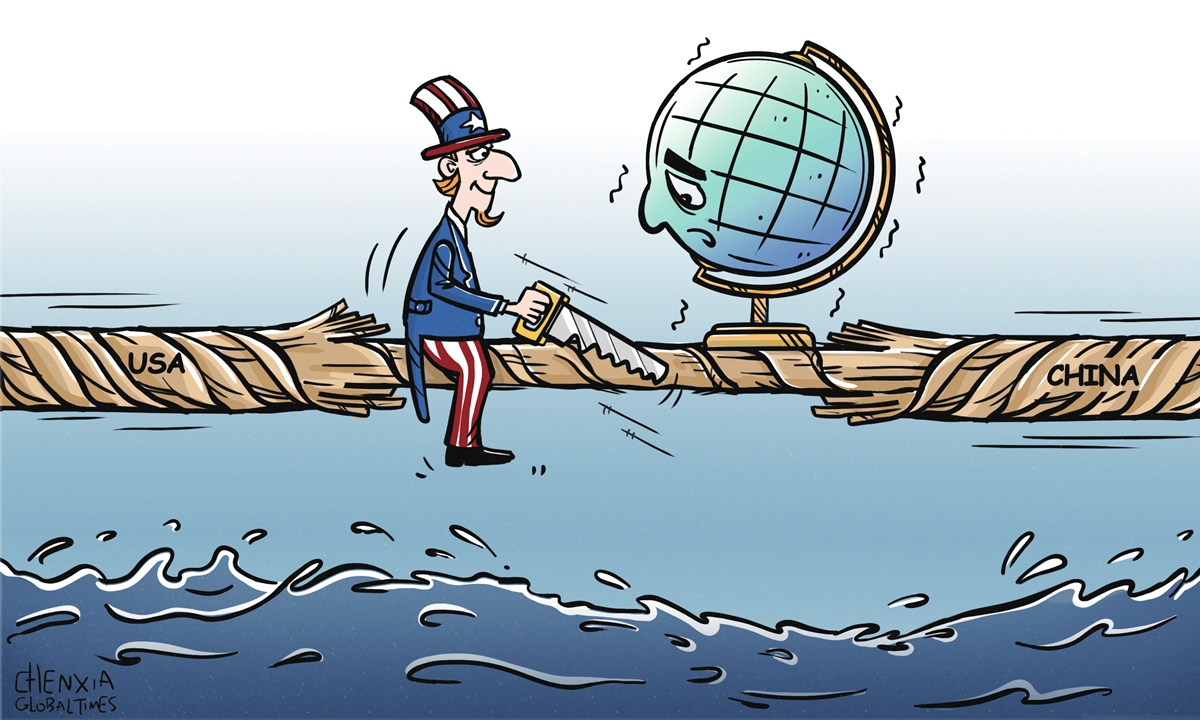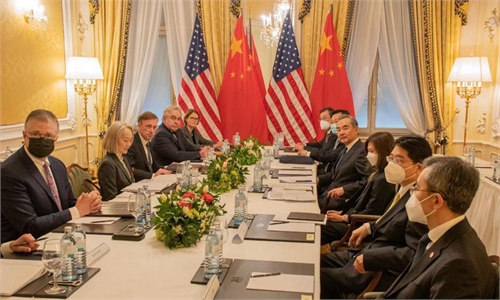
Illustration: Chen Xia/GT
In recent months, subtle changes have taken place in China-US relations. Although the context is intricate, there are small signs to follow. By linking several overt or covert trends with key details, it may be possible to find out the new connotation of the China-US competition in the next stage.
First, in the field of security, while the US continues to press hard and tighten the net in the Indo-Pacific, it seems to frequently extend an "olive branch" to conduct high-level dialogue with China to prevent bilateral relations from getting out of control. This contradiction is intriguing and needs to be carefully judged.
From the perspective of foreign policy and security-military deployment, it is really hard to see that the US has a true intention to ease China relations. At the political and diplomatic levels, the US has completely disregarded international law, conventions, and the basic etiquette of interaction between major powers, and refused to lift illegal sanctions against China's defense minister. On the eve of the Shangri-La Dialogue, the US sought to arrange a meeting between the defense chiefs of the two countries. Such an insincere "meeting" is of course unacceptable to China.
While the two militaries exchanged a war of words at the Shangri-La Dialogue, the Taiwan Straits were not peaceful. On Saturday, a US destroyer and a Canadian frigate made a transit through the Taiwan Straits.
The Biden administration has repeatedly emphasized "setting guardrails that enable responsible management of competition between China and the US" and ensuring "that competition should not tip over into conflict or confrontation." Despite that, all the signs have shown that this is just a strategy of rhetoric to restrain China's countermeasures.
Second, in the fields of economics and global trade policy, the US seems to have "reflected" on itself, but, in reality, it has continued to go further down the wrong path.
At the end of April, National Security Advisor Jake Sullivan made a speech, entitled "Renewing American Economic Leadership," at the Brookings Institution. He argued that the US should reach a "new Washington consensus" that integrates its domestic economic policy with global security agenda.
Many international analysts believe that this speech has important historical significance because it not only deeply reflects on and even denies free-market economic policies but also introduces some previously "politically incorrect" concepts. What was once considered "politically incorrect" is now being packaged as a new idea by the Biden administration to endorse its policies, which is truly lamentable.
However, Washington's rethinking of the US' economic model is superficial. They completely ignore that the real cause of the gradual decline of the US from its "heyday" was not, or at least not exclusively, "neoliberalism," but rather a social decline, governance failures, and international abuse of hegemony and overreach with US characteristic.
In the economic field, another noteworthy statement is that the US?openly declares that it is no longer seeking "decoupling" from China but rather "de-risking." How should we understand this statement? Simply put, some Americans used to view China as a "parasite." They believed that they had "rebuilt China" and that China had "ungratefully" sucked, exploited, and plagiarized from the US, causing Americans to lose their jobs. Therefore, the US?wanted to "decouple" from China.
Now, the US has seen China's strength and the deep intertwining of the economies, industrial chains, and supply chains of the two sides, it realizes that hasty decoupling will do more harm than good. But the US will not reflect on itself. Instead, it regards China as a "puffer fish," whose meat is delicious and edible, yet there are poisonous glands in its body, so must be cut open and the poisonous parts must be removed by an experienced chef with a knife. This is called "de-risking."
Nevertheless, no matter how many calculations the US has made, it has failed to reflect on itself. Its cognitive premise is wrong from very beginning — China is neither a "parasite" nor a "puffer fish," but a waking sleeping lion, or a soaring dragon. Therefore, the so-called de-risking by the US toward China has already failed morally. It is a typical behavior of someone being sick but forcing others to take pills.
Be it at the strategic-security level or at the technical-economic level, the US "reflection" on China and China-US relations is superficial and fragmented. It can even be said that it ignores objective facts and is against the international community, which opposes camp confrontation and calls for unity and cooperation. That being said, the future of China-US relations is not optimistic. Chinese who love peace and concentrate on development need to plan ahead, have the necessary bottom line awareness to prepare for the worst-case scenario, for the possible arrival of storms in ties.
The author is a distinguished research fellow at the School of Management at Huazhong University of Science and Technology. opinion@globaltimes.com.cn

